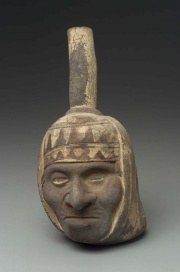Difference between revisions of "Crazing"
Jump to navigation
Jump to search
m (Text replace - "[http://cameo.mfa.org/materials/ h" to "[h") |
|||
| Line 1: | Line 1: | ||
| − | [[File:Image3_802448.jpg|thumb| | + | [[File:Image3_802448.jpg|thumb|Moche bottle<br>MFA# 50.247]] |
== Description == | == Description == | ||
| − | + | [[File:Image3_802383.jpg|thumb|Porcelain duck<br>MFA# 1985.81]] | |
Numerous, irregular, hairline cracks that may occur in ceramic glaze, paint, adhesive, concrete, parchment, or lacquer. Crazing may be due to nonuniform shrinkage on drying or cooling. It may also occur due to stress or inherent defects in the material. In varnishes, crazing may occur as the film becomes brittle. Crazed surfaces may have microscopic size cracks that produce a white hazy appearance. | Numerous, irregular, hairline cracks that may occur in ceramic glaze, paint, adhesive, concrete, parchment, or lacquer. Crazing may be due to nonuniform shrinkage on drying or cooling. It may also occur due to stress or inherent defects in the material. In varnishes, crazing may occur as the film becomes brittle. Crazed surfaces may have microscopic size cracks that produce a white hazy appearance. | ||
| − | == | + | ==Resources and Citations== |
| − | + | * For information on cracks caused by humidity and temperature see: M.F. Mecklenburg, Smithsonian Museum Conservation Institute, "Determining the Acceptable Ranges of Relative Humidity And Temperature in Museums and Galleries" [http://www.si.edu/mci/downloads/reports/Mecklenburg-Part1-RH.pdf Part 1, Structural Response to Relative Humidity] and [http://www.si.edu/mci/downloads/reports/Mecklenburg-Part2-Temp.pdf Part 2, Structural Response to Temperature] | |
| − | |||
| − | |||
| − | |||
| − | |||
| − | |||
| − | |||
| − | |||
| − | |||
| − | |||
| − | |||
* Ralph Mayer, ''A Dictionary of Art Terms and Techniques'', Harper and Row Publishers, New York, 1969 (also 1945 printing) | * Ralph Mayer, ''A Dictionary of Art Terms and Techniques'', Harper and Row Publishers, New York, 1969 (also 1945 printing) | ||
Revision as of 15:37, 6 July 2022
Description
Numerous, irregular, hairline cracks that may occur in ceramic glaze, paint, adhesive, concrete, parchment, or lacquer. Crazing may be due to nonuniform shrinkage on drying or cooling. It may also occur due to stress or inherent defects in the material. In varnishes, crazing may occur as the film becomes brittle. Crazed surfaces may have microscopic size cracks that produce a white hazy appearance.
Resources and Citations
- For information on cracks caused by humidity and temperature see: M.F. Mecklenburg, Smithsonian Museum Conservation Institute, "Determining the Acceptable Ranges of Relative Humidity And Temperature in Museums and Galleries" Part 1, Structural Response to Relative Humidity and Part 2, Structural Response to Temperature
- Ralph Mayer, A Dictionary of Art Terms and Techniques, Harper and Row Publishers, New York, 1969 (also 1945 printing)
- Theodore J. Reinhart, 'Glossary of Terms', Engineered Plastics, ASM International, 1988
- Matt Roberts, Don Etherington, Bookbinding and the Conservation of Books: a Dictionary of Descriptive Terminology, U.S. Government Printing Office, Washington DC, 1982
- Dictionary of Building Preservation, Ward Bucher, ed., John Wiley & Sons, Inc., New York City, 1996

